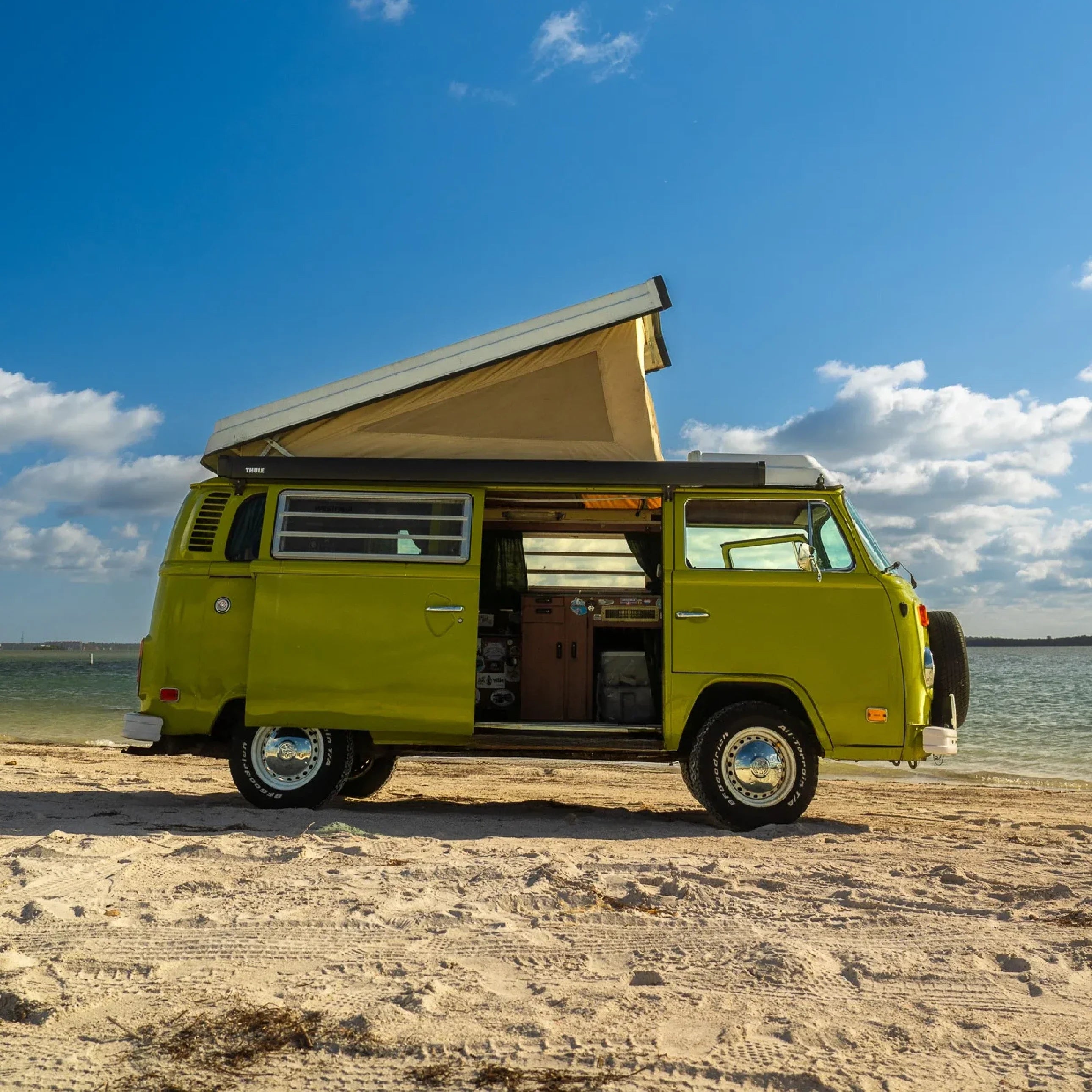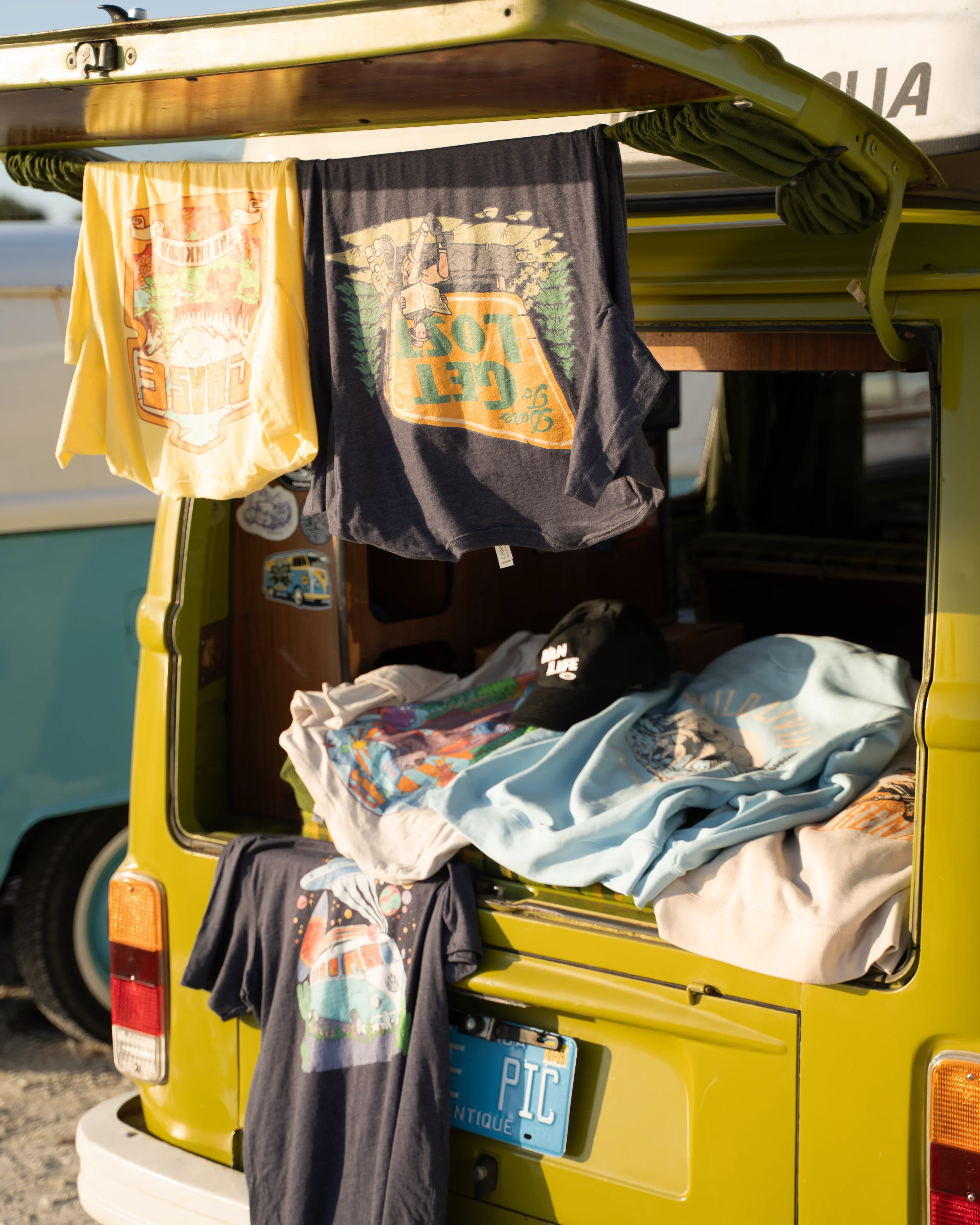When most people think of the van life, they picture freedom: endless roads, stunning sunsets, and the ability to call anywhere home. What often goes overlooked is how Vanlife can be one of the most environmentally conscious ways to live. Especially if it’s done with intention.
Compared to traditional housing, van life naturally encourages a smaller footprint. With limited space, you own less, use less, and waste less. With mobility, you spend more time outdoors and gain a deeper appreciation for nature.
And with the rise of solar power, composting toilets, and eco-friendly builds, Vanlifers are proving that life on the road can be about adventure and sustainability, too.
This guide explores the good Vanlife already does for the environment and the ways we, as a community, can keep nature safe for future travelers.
Downsizing
One of the biggest environmental benefits of Vanlife comes before you even hit the road: downsizing your possessions.
Moving into a van forces you to prioritize. Every item has to earn its space. Clothes, cooking supplies, gear, and even sentimental belongings. This process dramatically reduces overconsumption. Instead of buying things to fill a house, you buy only what you truly need.
-
Fewer clothes means less laundry and water use.
-
Smaller kitchens mean less food waste.
-
Limited storage curbs impulse buying.
By design, Vanlife is minimalism in motion. The less we consume, the lighter our footprint.
Smaller living space = smaller energy needs
Heating or cooling a 2,000-square-foot house takes energy. Heating or cooling a van? Much less.
Many Vanlifers insulate their rigs and rely on natural ventilation, saving huge amounts of energy compared to traditional homes. And because energy is a limited resource on the road, you quickly learn to be efficient: turning off lights, conserving battery power, and embracing simpler routines.
This natural shift toward energy awareness makes Vanlife more eco-conscious than many realize.
Solar power
If there’s one upgrade that has redefined sustainable Vanlife, it’s solar panels.
Instead of burning fuel to power generators, many Vanlifers now harness the sun for everything from fridges to laptops. Solar setups are quiet, renewable, and completely clean.
The beauty is that solar reduces environmental impact and it provides true independence. You can park in the desert, mountains, or forest and live comfortably without tapping into nonrenewable sources.
As more Vanlifers invest in solar, the movement shifts further toward sustainability, proving that mobile living and renewable energy go hand in hand.
Water conservation becomes second nature
Traditional households use 82 gallons of water per person, per day (EPA). Vanlifers? Often less than 5–10 gallons.
Why? Because you learn to:
-
Take “navy showers” (quick rinse, soap, rinse).
-
Use low-flow faucets and sprayers.
Vanlife naturally fosters water mindfulness. A habit that, if more households adopted, would dramatically reduce water waste worldwide.
Reduced waste and smarter consumption
Without curbside pickup, you become more aware of the waste you generate. Many Vanlifers switch to:
-
Reusable water bottles and coffee mugs.
-
Cloth towels instead of paper towels.
-
Bulk food purchases to cut packaging.
And because you’re often camping in remote areas, you’re more motivated to pack it in, pack it out. Vanlifers know that if trash piles up in nature, it ruins the experience for everyone. This culture of accountability makes the community stronger stewards of the environment.
Closer to nature, stronger respect for it
Perhaps the most underrated environmental benefit of van life is the shift in perspective it creates.
Living on the road means waking up to mountain views, falling asleep under desert skies, and noticing the stars more than the streetlights. This daily immersion in natural beauty makes you care more deeply about preserving it.
It’s one thing to recycle at home but it’s another to walk a fragile trail or see plastic washed up on a pristine beach. Vanlife connects people directly to the land, and with connection comes responsibility.
Supporting local communities
Vanlifers often shop at local farmers markets, roadside stands, and small-town businesses. This not only reduces supply-chain emissions (by avoiding heavily packaged, long-distance goods) but also strengthens local economies.
By choosing to buy fresh, local produce or handmade goods, Vanlifers cut down on waste while supporting sustainable food systems.
Building vans with sustainability in mind
The Vanlife community has also embraced eco-friendly building practices. More rigs now feature:
-
Reclaimed wood for cabinets and furniture.
-
Low-VOC paints and sealants to improve air quality.
-
Recycled insulation materials like denim or sheep’s wool.
Every sustainable choice in a build reduces environmental impact and sets a new standard for future travelers.
Travel that inspires environmental awareness
Vanlife naturally encourages slower travel. Instead of rushing through airports or hopping on multiple short-haul flights, you move gradually, savoring the journey. This reduces reliance on air travel (one of the biggest carbon contributors).
And unlike conventional vacations where travelers stay in resource-heavy hotels, Vanlifers rely on self-contained systems—making their environmental footprint smaller over time.
How Vanlifers do even better for the environment
While Vanlife already does a lot for the environment, there are ways some Vanlifers go further to help. Here are ways Vanlifers are making road life even greener:
-
Drive less, stay longer: Instead of moving every day, they spend more time in each place. This saves fuel and deepens your connection to the land.
-
Choose eco-friendly products: Biodegradable soaps, bamboo utensils, composting toilets, and refillable containers all make a difference.
-
Share knowledge: Lead by example. Whether it’s picking up trash at a campsite or posting sustainable practices online.
-
Support conservation efforts: Many Vanlifers donate to organizations that protect the public lands they love.
-
Avoid overcrowded spots. Explore lesser-known areas to reduce strain on popular destinations.
Vanlife offers lessons the whole world can learn from.
Imagine if every household conserved water the way Vanlifers do.
Imagine if every neighborhood embraced solar the way vans do.
Imagine if every consumer questioned every purchase—“do I really need this, or is it just taking up space?”
Vanlife helps us live lighter on the planet by consuming less, conserving water, using renewable energy, and respecting the places we visit. But the responsibility doesn’t stop there. The road is wide open, but it’s also fragile. With mindfulness,
Vanlifers can not only explore the world but they can help protect it for generations to come because the best feeling is knowing you’re leaving the world better than you found it.


